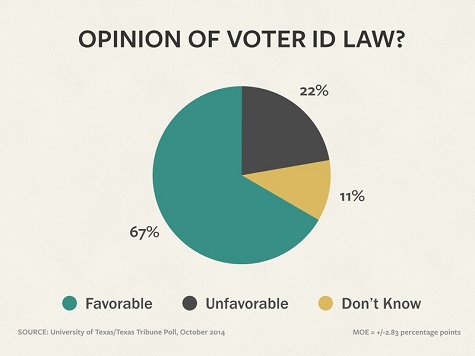AUSTIN, Texas — The latest University of Texas/Texas Tribune poll shows that over two-thirds of Texas voters have a favorable opinion of the state’s Voter ID law, and over half have a very favorable opinion. The majority also do not believe that the law has a negative effect on voter turnout, with 43 percent saying that it has no effect, 8 percent saying it increases turnout, 38 percent saying that it decreases turnout, and 10 percent answered “don’t know”.
Texas’ Voter ID law was passed during the 2011 legislative session and requires voters to show a photo ID from a list of specific approved forms of identification in order to vote. Earlier this month, a federal judge appointed by President Barack Obama issued a ruling finding that the law was “imposed with an unconstitutional discriminatory purpose” and “constituted an unconstitutional poll tax.” Attorney General Greg Abbott appealed this decision to the Fifth Circuit Court of Appeals, arguing that “voter confusion” would result if the law, which had been in place for over a year, was reversed so close to the November 4 election and the start of early voting. The Fifth Circuit agreed and issued a stay, allowing the law to be enforced during the Texas elections this year. The litigation over the law has not yet reached a final resolution and will resume after the election.
The Tribune also reported that 85 percent of Republicans have a “very favorable” opinion of the Voter ID law, as well as 51 percent of Independents, and 19 percent of Democrats. (Note: They did not report the partisan breakdown of how many reported a “favorable” opinion as well.) The Voter ID law is supported by half of the black voters who were polled, and a majority of Hispanics, although the Tribune did not provide specific figures.
The poll was conducted from October 10 and October 19, polling 1,200 registered voters with a margin of error of plus or minus 2.83 percent. Some questions screened for likely voters, polling 866 likely voters with a margin of error of plus or minus 3.33 percent. In addition to the questions about Voter ID, the poll asked voters about a long list of candidates and issues. Among some of the other noteworthy results:
-
In response to the border crisis, 44 percent strongly support Governor Perry’s deployment of Texas National Guard troops to the border, 27 percent somewhat support, 9 percent somewhat oppose, and 13 percent strongly oppose. Ninety-three percent of Republicans supported the deployment, as well as 74 percent of Independents. Democrats were nearly evenly split. Seventy-four percent of whites, 65 percent of blacks, and 62 percent of Hispanics support the deployment.
-
Regarding allowing illegal immigrants who graduate from Texas high schools to pay in-state tuition at Texas colleges, 32 percent supported it, 52 percent said they should pay out-of-state tuition rates, and 16 percent did not know or did not answer. Among Hispanic registered voters, 40 percent favored charging them in-state tuition and 44 percent favored out-of-state tuition. Nineteen percent of Republicans support in-state tuition, and 68 percent say charge out-of-state tuition. Fifty percent of Democrats support in-state tuition, 31 percent support out-of-state tuition. Twenty-six percent of Independents support in-state tuition, 58 percent support out-of state tuition.
-
Obama’s approval rating remains very low in Texas, with 48 percent disapproving strongly, 9 percent somewhat disapproving, 7 percent neutral, 22 percent somewhat approving, and 14 percent strongly approving. Perry does better, with 22 percent strongly approving, 24 percent somewhat approving, 13 percent neutral, 11 percent somewhat approving, 27 percent strongly approving.
-
Every single statewide Republican candidate has a double digit lead over their Democratic opponents among likely voters.
-
When asked for their opinion on the “most important problem facing this country today,” the top answers were economy (14 percent), political corruption/leadership (11 percent), national security/terrorism (9 percent), federal spending/national debt (8 percent), immigration (6 percent), border security (6 percent), and unemployment/jobs (6 percent). The same question was then asked about the “most important problem” facing Texas, and the top answers were border security (23 percent), immigration (18 percent), political corruption/leadership (9 percent), education (7 percent), the economy (6 percent), health care (5 percent), and unemployment/jobs (4 percent).
-
In the national “most important problem” question, abortion was ranked 20th and was selected by only 1 percent of respondents, and ranked 13th in the state question, selected by only 2 percent of respondents. This may be part of the reason that Wendy Davis, famous for last year’s filibuster of the abortion bill, has been unable to gain traction in the Governor’s race.
-
Another key to Davis’ campaign troubles: Greg Abbott’s favorability has steadily grown since last summer, with voters generally liking him as they got to know him. Currently, 23 percent have a very favorable opinion of him, 24 somewhat favorable, 12 percent neutral, 11 somewhat unfavorable, 23 percent very unfavorable. In comparison, Davis has been far more polarizing and continued to get increasingly negative ratings as voters got to know her better. Her “very unfavorable” ratings went from 6 percent in June 2013, when 58 percent of likely voters still had no opinion of her, to 36 percent this month, when only 7 percent did not know her.
Follow Sarah Rumpf on Twitter @rumpfshaker

COMMENTS
Please let us know if you're having issues with commenting.